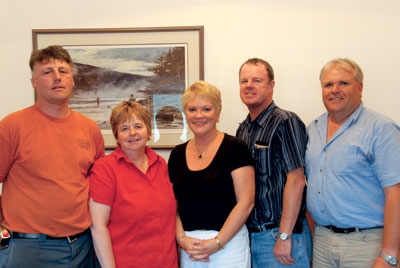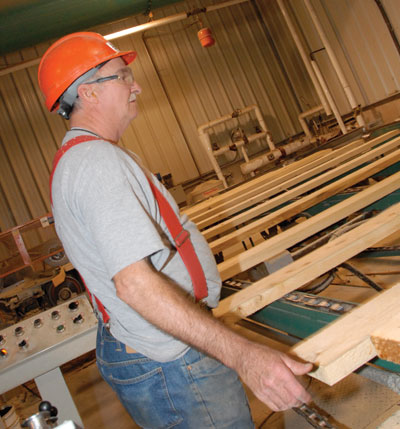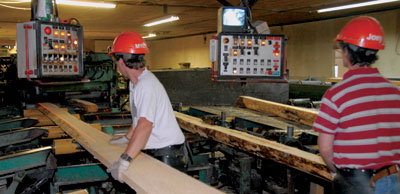
Features
Mills
Sawmilling
Not Your Ordinary Sawmill
The Elmsdale Lumber Company Ltd. (ELCO) isn’t your ordinary sawmill, and the crews and management team at this small specialty facility in Elmsdale, N.S., are the first to admit it. In fact, they say they wouldn’t have it any other way and are quick to acknowledge that it is one of the reasons they are surviving the current storm in the forest industry.
December 1, 2011 By Bill Tice
 ELCO has a number of long-term employees. Pictured above (left to right) are Stephen Molnar The Elmsdale Lumber Company Ltd. (ELCO) isn’t your ordinary sawmill
ELCO has a number of long-term employees. Pictured above (left to right) are Stephen Molnar The Elmsdale Lumber Company Ltd. (ELCO) isn’t your ordinary sawmillThey will also tell you the last couple of years haven’t been easy, but neither has the company’s 90 plus-year history. Just ask Downey Thompson. He’s seen it all and has been solving problems at ELCO for 62 years, and there’s not much chance of anyone unseating this spry 78-year-old as the company’s longest-term employee anytime soon. He still comes to work every day in his role as senior woodlands consultant, working closely with his son Stephen, who has been with ELCO for 35 years and is the company’s woodlands manager. The father and son team are just two of the 30% of ELCO employees that have more than 20 years of tenure with the company.
But it’s not just long-term employees that set this company apart from others in the industry. “We are very open with every employee on everything we do,” explains Gennie Himelman, ELCO’s controller, who laughs when asked how long she has been with the company. “I came here for six months and now I’m on my 17th year,” she concedes as she goes on to explain her comments about openness. “We have no hidden agendas. We put everything on the table, and if we have a problem or an issue that needs to be resolved, we will sit here for as long as it takes for us to find a suitable solution. The way we look at it is that we are all part of the same team and if we need a solution, we will bring everyone into play, from our woodlands staff to the guys that run the planer mill or the kilns, and that’s just not something you find within many organizations.”
Getting it Right
Himelman recounts a story about one of ELCO’s long-term customers to illustrate her point. “A few years ago one of our customers here in Nova Scotia was having a few issues with the planing on our lumber, “ she says. “Rather than bringing samples back to the mill for our production staff to look at and just passing on our customer’s comments, we shut the planer mill down and took every member of our planer mill staff to the customer. That’s how important it is for us to get everyone involved. We wanted to eliminate the problem and this gave our guys a chance to talk one on one with the customer and see first hand what the issue was, how it affected the customer, and what we needed to do to fix it. And, as a result, we still have that
customer today.”

ELCO’s president, Robin Wilber, adds that, unlike large corporations or companies with multiple locations, ELCO can turn on a dime. “Adaptability is one of the main keys to our success,” he explains. “We change and adapt to meet the needs of our customers every day. That’s just something you can’t do in most 2×4 or 2×6 mills where you are tied into specific commodity products. If there is a demand for a product and we can make that product, even if it is a niche product or market, we will fill that demand.”
Adaptability is Key
On the sales side, Derek Prest echoes Wilber’s comments. “As with our product mix, we have been able to adapt quickly to changing markets over the years as well,” he says. “The company has always maintained a strong market base here in Nova Scotia, but we have been able to come and go with markets overseas as well, especially Iceland and the United Kingdom (U.K.). There came a time when we had to leave the U.K. market completely due to oversupply issues from Eastern Europe, but through building strong business relationships with customers, we were able to regain some of those customers when the market became sustainable again.”
Prest is in a unique situation as he is now a former 25 plus-year employee with ELCO but spends time at the ELCO office almost every week. “I started with ELCO in 1981 and grew with the company under the wing of Jim Wilber, who was Robin’s father,” he explains. “Following Jim’s passing in 1990 I worked very closely with Robin and although I went on to the role of general manager for the mill, I was always involved with the marketing side of the business. Just over a year ago, when I felt it was time to make room in the business for the fourth generation of Wilbers, I stepped aside so that Robin’s son Mark could have an opportunity to take on more responsibility. I left ELCO at that time and took a position with our long-term export sales partner, Eacan Timber Limited, in nearby Waverley, N. S.”
Where most companies would have said their goodbyes and sent Prest on his way, ELCO once again took a different approach, offering the former member of the management team the opportunity to take on his new challenge while still keeping a hand in at the mill. “I officially work for Eacan, but I still spend a lot of time here at ELCO and that has been good for both companies and it has been good for me,” he says.
Prest is not the only example of ELCO’s long-term commitment to employees. A number of years ago, the company encouraged current woodlands manager Stephen Thompson to venture out into the log harvesting side of the business. He started Beaver Dam Enterprises (see more on Beaver Dam in the Sept/Oct issue of Canadian Forest Industries available online at www.canadianforestindustries.ca), contracting out much of the work while he maintained his day job at ELCO. Today, Stephen’s son and Downey’s grandson, Mark Thompson, runs the logging company, and, of course, its largest customer is ELCO.
External Kudos
But it’s not just ELCO employees who sing the praises of the company. The Conference Board of Canada has recognized ELCO for its workplace initiatives and in 2004 the company was presented with the Award for Excellence in Workplace Literacy under a small business literacy initiative.
“We started a workplace education program in 1999 to help some of our employees achieve their high school graduation equivalency (GED program) and we have now put 12 people through that process,” Himelman says. “Once we realized there was a need for this, we called the Nova Scotia Department of Education and they were pleased to partner with us and they were here the next day. We set up classes at the mill and have been training folks ever since.”

Himelman says one of the best success stories is Mel Lively, a 37-year employee who works in the planer mill. “Mel had little ability to read and write and wanted to be able to read a book to his grandchildren,” she explains. “Not only can he now read a book, he wrote a book and that is one of the reasons for the positive recognition we have received for our program.” (Mel’s Story can be found online at: skillsnovascotia.ednet.ns.ca/documents/Mels_Story.pdf)
A Simple Sawmill
In the sawmill itself, not much has changed over the years. It is a very simple sawmill, yet highly efficient. Mill manager Stephen Molnar says, “continual tweaking” has been the name of the game. “We’re always looking for a better way to do things,” he notes. “It’s not always about having the latest equipment, but how you make the equipment you have work for you.”
Molnar, who has been at ELCO for 30 years, also adds that managing people properly is just as important to the success of the mill as the equipment they have to work with. “We put a lot of effort into our supervisory training skills program because in most cases people become a foreman or a supervisor because they are good at something. That doesn’t necessarily mean that they are a good manager though so we feel it is very important to train our supervisors properly and provide them with the skills they need to manage people and keep things moving in production.”

The mill flow starts when incoming log trucks pass over a self-weighing scale. From there, 30% of the logs are hot fed right into the mill, while the balance is moved to the back of the yard so that older inventory can be used first. A Fuchs loader equipped with a trailer completes most of the yard work, moving log inventory as needed and loading the mill’s infeed. All logs utilized by ELCO are cut-to-length and are processed through a Forano debarker with interchangeable 18-in. and 30-in. rotors. Larger logs, which are 14-in. and up in diameter, are then directed to a PHL headrig with a carriage from Cardinal Distribution Inc., while smaller logs are sent to a PHL twin saw. Side boards from the headrig and the twin saw go to a Valley combination edger. Everything is then sent to the tailing table and then to a Canadian style trimmer and the green chain, which is where 80% of the mill’s staff got their start, including the current mill manager. A grader situated just before the green chain monitors quality and selects products for the current order file.
Some product is shipped directly to the customer as green, while the balance is either sent to a pair of American Wood Dryer 82,000 board ft. capacity kilns for drying to customer specifications, or put into inventory for drying at a later date. A biomass energy system, including a KMW boiler installed in 1995, powers the kilns and produces heat for the sawmill and planer mill, all from planer mill shavings. The mill is 100% self-sufficient in this department.
Once dry, any lumber that will be planed is processed through a 16-knife Yates planer, while all other major equipment in the planer mill, including the drop saw trimmer and the stacker, is from PHL. A manual wrapping station is the last stop on the production line.
ELCO sticks to what it knows best and runs primarily spruce, although on occasion they will run small amounts of pine and hemlock. They stay with one shift, which keeps the almost 60 employees on staff working full time, and they produce about 27 million board ft. of premium wood products annually. Dimension products produced by ELCO range in size from 1×3 to 2×12 in lengths up to 16 ft., while specialty products include beams up to 4×10 for log homes to siding products and square timbers. The mill also produces treated decking products and has the treating done off site by Goodfellow Lumber, which is also located in Elmsdale.
As for the current tough times, everyone at the table is confident that ELCO will come out of this downturn stronger than when it went in. “We are on a weight loss program that is second to none and our employees are just amazing at making things work,” says Himelman. She also credits the Royal Bank for supporting the company through the good times and the bad and she notes that when things pick up, they will be ready. “All of the belt tightening we have done will pay off,” she says. “We can’t wait for things to turn around as we feel we have the best team out there, and we are ready to play ball.
Print this page